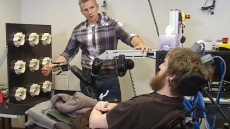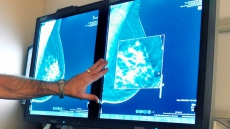New numbers on the global AIDS epidemic show some big successes, such as fewer deaths and new infections. But there are also some tragic failures: Only half the children with HIV, the virus that causes the disease, are getting treatment.
“We are making great progress against the HIV epidemic ... but the bad, bad news is that kids are lagging behind,” said Dr. Shannon Hader, deputy executive director of UNAIDS. The United Nations agency reported last year's numbers Monday at the start of an international AIDS conference.
Progress against HIV also is being hurt by another infectious disease — the new coronavirus. Four years ago, the United Nations set goals for limiting HIV infections and improving treatment by the end of 2020, and all will be missed because the coronavirus pandemic is hurting access to care, the report concludes.
“We were already off track for the 2020 targets, but COVID-19 is threatening to blow us completely of course,” said UNAIDS’ executive director, Winnie Byanyima.
A World Health Organization survey found that 73 countries are at risk of running out of HIV medicines and 24 have critically low stocks.
“Access to HIV medicines has been significantly curtailed” since the coronavirus pandemic began, said WHO's chief, Dr. Tedros Adhanom Ghebreyesus. “We must not turn our backs” on HIV while fighting COVID-19, he said.
Here are highlights from the UNAIDS report:
INFECTIONS
About 1.7 million new HIV infections occurred in 2019 — down 23% since 2010 but far short of the 75% reduction goal.
Eastern and southern Africa have greatly curbed new infections, but they’re rising elsewhere — by about 20% since 2010 in Latin America, the Middle East and north Africa, and 72% in eastern Europe and central Asia.
“We have countries in other regions that are growing a next wave of epidemics among young people,” Hader said. “We’re still seeing 150,000 kids being newly infected with HIV each year.”
In sub-Saharan Africa, girls and young women make up 10% of the population but account for 25% of new HIV infections. In many cases, pregnant women aren’t getting tested or don’t stay on drugs that can prevent spreading the virus to their babies, Byanyima said.
TREATMENT
Worldwide, 38 million people have HIV and 81% of them are aware of it. About 25.4 million are on treatment, triple the number since 2010.
Roughly 67% of adults with the virus are getting treatment. But only 53% of children and teens are, meaning 840,000 of them are missing out on life-saving drugs.
Besides reaching more kids to provide care, “we need the science to come through for children” to develop easier treatments, Byanyima said. “It’s really hard if you’re a child ... 5, 6 or 7 ... to be on a tablet every day for the rest of your life,” or to have to conceal daily medicine use to keep HIV status a secret because of stigma around the disease, she said.
DEATHS
There were 690,000 AIDS-related deaths in 2019. That’s down 39% from 2010 but short of the target of under 500,000 by the end of this year.
Children accounted for 95,000 of those deaths.
“That’s a stain on our conscience ... because treatments are there,” Byanyima said. “It breaks my heart that 4,500 girls, young women, were being infected every week in Africa — every week! They are many times, three or four times, more vulnerable than boys and men of the same age because of social norms, because of lack of education, opportunity.”
COVID-19'S IMPACT
In many countries, Byanyima said, health workers testing for and caring for people with HIV have switched to fighting COVID-19; supplies of medicines and condoms have been disrupted because of lockdowns; and many health clinics have closed.
Dr. Anton Pozniak, head of the AIDS conference and an HIV specialist at Chelsea and Westminster Hospital in London, said many HIV patients have delayed seeking care out of fear of getting the coronavirus. Some are even afraid to have medicines delivered to their homes because “they don’t want the stigma of parcels and drugs arriving” that might reveal their HIV status, he said.
Another conference leader, Dr. Monica Gandhi of the University of California, San Francisco, said that in her large HIV clinic, a smaller percentage of patients now have their HIV under control.
“We’re very, very worried, profoundly worried,” about COVID-19 harming patients and efforts to curb the HIV, she said.
A six-month interruption of HIV services in sub-Saharan Africa would mean 500,000 deaths, according to estimates by UNAIDS, the WHO and the Bill & Melinda Gates Foundation.
That would mean a return to death levels last seen in 2008, “and I think we have to admit, we just can’t allow that to happen,” said Hader, the UNAIDS official.




